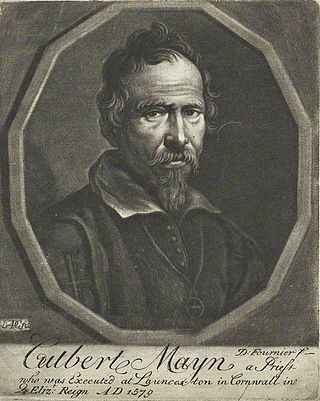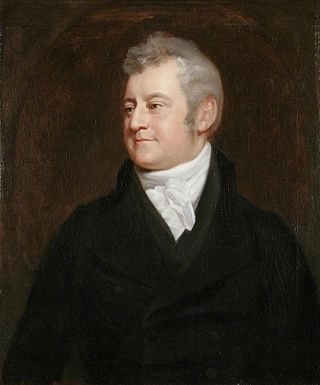Related Research Articles
Matthew Paul Moyle was an English meteorologist and writer on mining, second son of John Moyle, by Julia, daughter of Jonathan Hornblower, was born at Chacewater, Cornwall, 4 October 1788, and educated at Guy's and St. Thomas's Hospitals.
Henry Power (1623–1668) was an English physician and experimenter, one of the first elected fellows of the Royal Society.
John Allen (1789–1829) was an English bookseller and antiquary, notable for his work on the history of Herefordshire.

William Baker was an English churchman and academic, Warden of Wadham College, Oxford, Bishop of Bangor and bishop of Norwich.
William Belsham (1752–1827) was an English political writer and historian, noted as a supporter of the Whig Party and its principles. He justified the American Revolution in excusing Americans in their resistance to the demands of England, and he was an advocate of progressive political liberty.

The New College at Hackney was a dissenting academy set up in Hackney in April 1786 by the social and political reformer Richard Price and others; Hackney at that time was a village on the outskirts of London, by Unitarians. It was in existence from 1786 to 1796. The writer William Hazlitt was among its pupils, sent aged 15 to prepare for the Unitarian ministry, and some of the best-known Dissenting intellectuals spent time on its staff.
William Coward (1648–1738) was a London merchant in the Jamaica trade, remembered for his support of Dissenters, particularly his educational philanthropy.

Abraham Aurelius was an English pastor of the French Protestant church in London.
Anthony Maxey, was the Dean of Windsor.
Peregrine Branwhite (1745–1795?), was an English poet.
Benjamin Donn or Donne (1729–1798) was an English mathematician.

Samuel Argent Bardsley, MD, was an English physician.

Daniel Fournier was an English engraver and draughtsman.
Charles Parkin (1689–1765) was an English clergyman and antiquarian. He was rector of Oxburgh in Norfolk, and assisted Francis Blomefield on his history of the county, completing it after Blomefield's death.

Frank Sayers (1763–1817) was an English poet and metaphysical writer.

Edward Forster the Elder was an English banker and antiquary.

George John Singer (1786–1817) was an English early pioneer of electrical research, noted for his publications and for lectures delivered privately and at the Russell Institution.

Edward Rigby (1747–1821) was an English physician, writer, and local politician.
References
- . Dictionary of National Biography . London: Smith, Elder & Co. 1885–1900.
- Attribution
![]() This article incorporates text from a publication now in the public domain : "Brook, Abraham". Dictionary of National Biography . London: Smith, Elder & Co. 1885–1900.
This article incorporates text from a publication now in the public domain : "Brook, Abraham". Dictionary of National Biography . London: Smith, Elder & Co. 1885–1900.